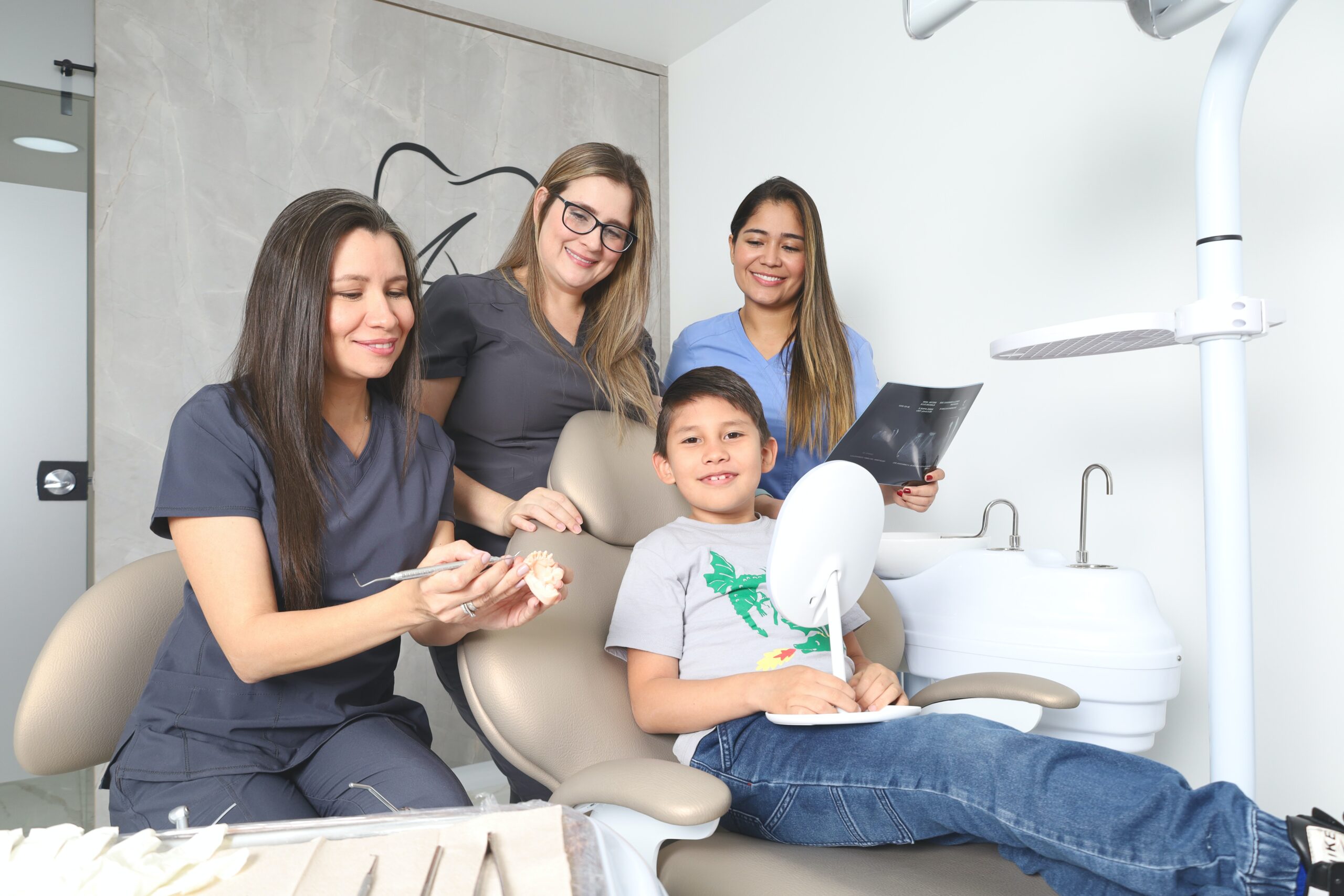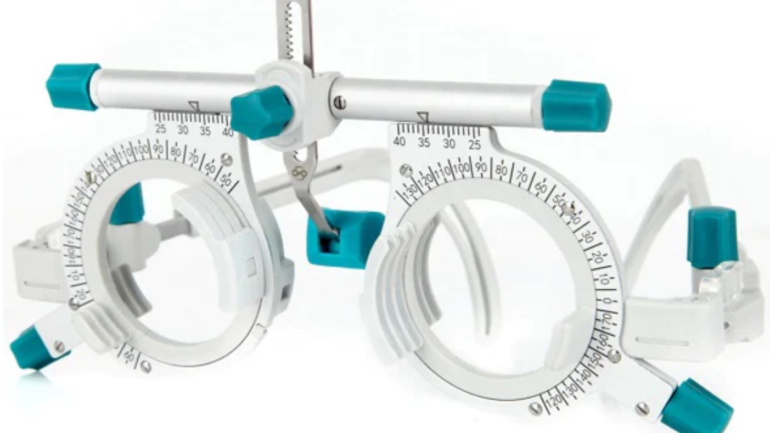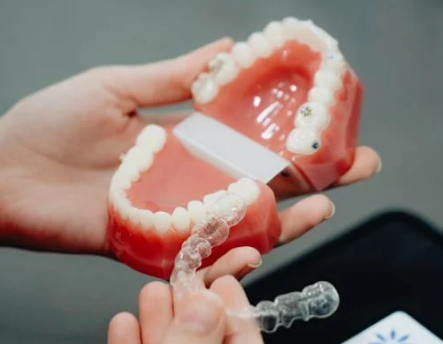Keeping your child’s teeth and mouth healthy is a continuous task that doesn’t end once you leave a dental appointment. From asking about dental hygiene habits to discussing treatment options, there are several key questions that you should ask a dentist for kids to help you gain important insights into your child’s oral health, so read on to explore our comprehensive list and make sure your little one’s smile stays healthy and bright.
⦁ When should my child see a dentist for the first time?
The first dental visit is an important milestone in your child’s life and it’s recommended that your child sees a dentist for the first time when their first tooth appears, or no later than their first birthday. This first visit may seem very early, but it allows the kid’s dentist to monitor the growth and development of your child’s teeth and to give you advice and guidance on how to properly care for your child’s developing oral health, as well as allowing them to catch any potential issues early on.
⦁ What happens during a first dental visit?
During your child’s first dental visit, the dentist will perform a thorough examination of their teeth, gums, and mouth. The key purpose of this visit is to assess the development of your child’s first few teeth, but also serves as an opportunity to conduct a more thorough examination of your child’s teeth and jaw structure, as well as check for any dental problems or oral health issues. In addition to the initial examination, the dentist will be able to answer any questions that you have about maintaining your child’s oral health.
⦁ How can I help my child combat fear during dental visits?
For many children, visiting the dentist can often be a source of stress or anxiety. It’s important to establish a positive relationship between your child and the kid’s dentist from an early age to ensure they feel comfortable and confident when visiting the dentist in the future as the first dental visit sets the stage for a lifetime of good oral health habits and can help alleviate any anxiety your child may have about visiting the dentist.
Firstly, it’s important to maintain a positive attitude and talk about dental visits in a positive light. Avoid using negative language or sharing your own fears or anxieties about the dentist, and instead focus on the importance of dental health and how the dentist is there to help keep their teeth strong and healthy. You can also prepare your child for their dental visit by explaining clearly what will happen during the visit using age-appropriate language and describing the different processes that the dentist will use so that your child is aware of the different sensations to expect ahead of time. Lastly, consider bringing a comfort item or toy to the dental visit to help your child feel more at ease during the appointment and whilst waiting to go in, and talk to your dentist about any specific concerns or strategies they may recommend to help your child combat fear.
⦁ What is the dentist’s approach to making children feel comfortable during their visits?
When choosing the best dentist for kids, it’s important to enquire about their approach to making children feel comfortable during their visits. A child-friendly dental practice will have a welcoming and inviting atmosphere, with staff members who are experienced in working with children, and by choosing a dental practice that prioritises the comfort and well-being of children, you can help ensure that your child has a positive and stress-free dental experience.
The dentists should have a designated waiting area that contains toys, books, and engaging resources to create a positive and engaging environment. Many dental practices also offer distractions such as TVs and music to help children feel more at ease during their appointments, and all staff should be friendly, patient, and knowledgeable about communicating with children, particularly those who are nervous or attending their first appointment.
For particularly nervous children who experience extreme anxiety and cannot be comforted by a calming atmosphere, or for those who require additional dental treatments, many dentists offer conscious sedation options. It’s important to discuss these options with your dentist to determine what is best for your child, and to consistently reinforce a positive message about the role that dentists play in protecting your child’s overall health to encourage them to build a positive association with dentists.
⦁ How can I ensure proper oral development for my child?
Baby teeth play a crucial role in your child’s oral development as they help your child chew, speak, and maintain space for permanent teeth. Taking care of your child’s baby teeth is essential for ensuring proper oral development and setting the stage for a lifetime of good oral health.
To take care of your child’s baby teeth, it’s important to establish good oral hygiene habits from an early age. Start cleaning your baby’s gums with a clean, damp washcloth even before the first tooth erupts, and once the first tooth appears, switch to using a soft-bristled toothbrush or a finger brush to clean their teeth. Practise good oral hygiene habits and teach your child the importance of brushing their teeth thoroughly at least twice a day and flossing regularly to maintain good oral health.
Genetic factors play a role in jaw development, which can affect overall oral health, so discreetly monitor your child’s jaw development if you have concerns about your child’s structural facial development, consult a dentist for kids, and make sure to attend regular dental check-ups to allow the dentist to assess any issues and provide guidance on proper oral care and any additional treatments that may be needed.
⦁ What good dental hygiene habits should I encourage my child to develop?
Developing good dental hygiene habits from an early age is crucial for maintaining your child’s oral health and by encouraging your child to practise good oral hygiene, you can help prevent tooth decay, gum disease, and other oral health issues.
Firstly, make sure your child brushes their teeth at least twice a day for two minutes each time. Use a soft-bristled toothbrush and a fluoridated toothpaste appropriate for their age and teach your child to brush in circular motions, reaching all surfaces of the teeth, including the gumline. In addition to brushing, it’s important to floss your child’s teeth once a day using an age-appropriate flossing technique, such as floss picks or floss holders, between each tooth and along the gumline, removing any plaque or food particles.
Limiting sugary snacks and drinks is also important for maintaining your child’s oral health as sugary foods and drinks can contribute to tooth decay and cavities. Encourage your child to eat a balanced diet with plenty of fruits, vegetables, and whole grains and encourage them to drink water and choose healthier snack options.
⦁ What common paediatric dental issues should I be aware of?
Parents should be aware of common paediatric dental issues such as tooth decay, root fractures, and chipped or broken teeth, as well as more general issues such as sensitivity in the teeth and pain or discomfort around the teeth and gums, as these issues can be symptoms of a larger issue deeper within the mouth.
These issues can cause problems with digestion, chewing, and speech, so it is crucial to address them promptly. To identify these issues, you should be on the constant look-out for symptoms such as toothaches, tooth sensitivity, visible decay or discoloration, swelling or redness of gums, and difficulty biting or chewing. If you notice any of these issues or your child begins regularly complaining of any symptoms, take your child to a paediatric dentist who specialises in treating these dental issues in children.
⦁ What preventive measures are available at your practice for these issues?
Prevention is key when it comes to maintaining your child’s oral health and many dental practices offer preventive measures specifically designed for paediatric dental issues to protect your child’s teeth and gums from common dental problems.
Regular dental cleanings and check-ups are the most important preventive measures for maintaining your child’s oral health. During these visits, the dental hygienist will thoroughly clean your child’s teeth, removing any plaque or tartar buildup, and the dentist will perform a thorough examination, checking for any signs of tooth decay, gum disease, or other oral health issues. Depending upon the specific requirements of your child, the dentist may apply a fluoride gel or varnish to your child’s teeth during their regular check-up to help strengthen tooth enamel and provide an extra layer of protection against tooth decay. By taking advantage of the preventive measures offered by your dental practice, you can help protect your child’s teeth and gums from common paediatric dental issues.
⦁ What treatment options are available if an issue arises?
Despite your best efforts to maintain your child’s oral health, dental issues can still arise. It’s important to be aware of the treatment options available from your kid’s dentist if an issue does occur, so you can make informed decisions about your child’s dental care.
If your child develops a cavity, the most common treatment option is a dental filling. The dentist will remove the decayed portion of the tooth and fill the cavity with a tooth-coloured filling material to restore the tooth’s function and prevent further decay. In some cases, a dental crown may be necessary to restore a severely decayed or damaged tooth, as a crown is a cap that covers the entire tooth, providing strength and protection. If your child does experience tooth loss due to decay, injury, or other reasons, the dentist may recommend a custom-made space maintainer to hold the space open for the permanent tooth to erupt properly. By understanding the treatment options available, you can work with your dentist to develop a treatment plan that best meets your child’s needs.
⦁ How do you involve parents in the dental treatment process for their children?
Reputable dentists will take care to involve parents in the dental treatment process by working as a team with parents to improve the oral health of their children. Both the dentist and you should continually reinforce the importance of attending regular dental checkups to your child, and remind them to properly care for their teeth at home.
Dentists should also maintain open communication and collaboration with parents, including explaining any treatment plans and procedures to parents and addressing any concerns or questions they may have regarding treatment. Additionally, dentists for kids should involve parents in the decision-making process by discussing treatment options with them and seeking their input. By involving parents in the dental treatment process, dentists can ensure that parents are informed, supportive, and actively participate in their child’s oral health care.
Asking the Right Questions for Your Child’s Dental Health
Asking the right questions when visiting a dentist for kids is essential for maintaining your child’s oral health. From scheduling the first dental visit to understanding treatment options, the answers to these top 10 questions will help you make informed decisions about the best kids’ dentist for your child.
Kids Dental is a specialist paediatric dentist in London, offering a wide range of preventive measures and treatments to give children the best possible start to their oral health journey, you can visit their website today to view their appointment availability.




